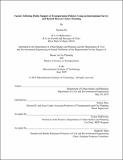Factors affecting public support of transportation policies : using an international survey and hybrid discrete choice modeling
Author(s)
Ni, Xuenan.
Download1140223641-MIT.pdf (40.53Mb)
Other Contributors
Massachusetts Institute of Technology. Department of Urban Studies and Planning.
Massachusetts Institute of Technology. Department of Civil and Environmental Engineering.
Advisor
Jinhua Zhao.
Terms of use
Metadata
Show full item recordAbstract
What transportation policies do people support? What factors affect people's policy support? Detangling people's support of transportation policies is a way to understand public needs, to understand how the public evaluates and envisions the role of government in shaping the current as well as future urban transport system, and to anticipate difficulties of implementing certain types of policies due to public resistance. It is important to study policy support because 1) understanding public opinions can lend legitimacy and responsiveness to policy making processes and outcomes, and 2) characterizing people based on their support for different types of mobility policies may help customize policies for different groups so that the municipalities can enhance the effectiveness or equity of implementing certain types of policies. This thesis models the factors that contribute to stated support of 11 different transportation policies in an international sample of 41,932 individuals in 51 countries/regions using the utility-maximizing approach of hybrid discrete choice. It analyzes transportation policy support expressed by individuals in the survey, with respect to their socio-demographic characteristics, travel modes, and attitudes. We find that across the globe, different age, gender and income groups prioritize policies differently and that generally individuals support policies that benefit their most typical transport mode positively. Moreover, by controlling for individual characteristics, a country-level analysis attempts to capture differences of policy support resulting from being of different nationalities. The results suggest that many countries share similarity in their policy support with other countries that are geographically adjacent, but there are also unexpected country peers that are far removed geographically, but have similar policy support. Overall, the methods and findings of this thesis may be useful for policymakers working on evaluating policy effectiveness for certain social groups and for researchers looking at what policy paths towards sustainable transportation that different countries might take.
Description
This electronic version was submitted by the student author. The certified thesis is available in the Institute Archives and Special Collections. Thesis: M.C.P., Massachusetts Institute of Technology, Department of Urban Studies and Planning, 2019 Thesis: S.M. in Transportation, Massachusetts Institute of Technology, Department of Civil and Environmental Engineering, 2019 Cataloged from student-submitted PDF version of thesis. Includes bibliographical references (pages 111-113).
Date issued
2019Department
Massachusetts Institute of Technology. Department of Urban Studies and Planning; Massachusetts Institute of Technology. Department of Civil and Environmental EngineeringPublisher
Massachusetts Institute of Technology
Keywords
Urban Studies and Planning., Civil and Environmental Engineering.